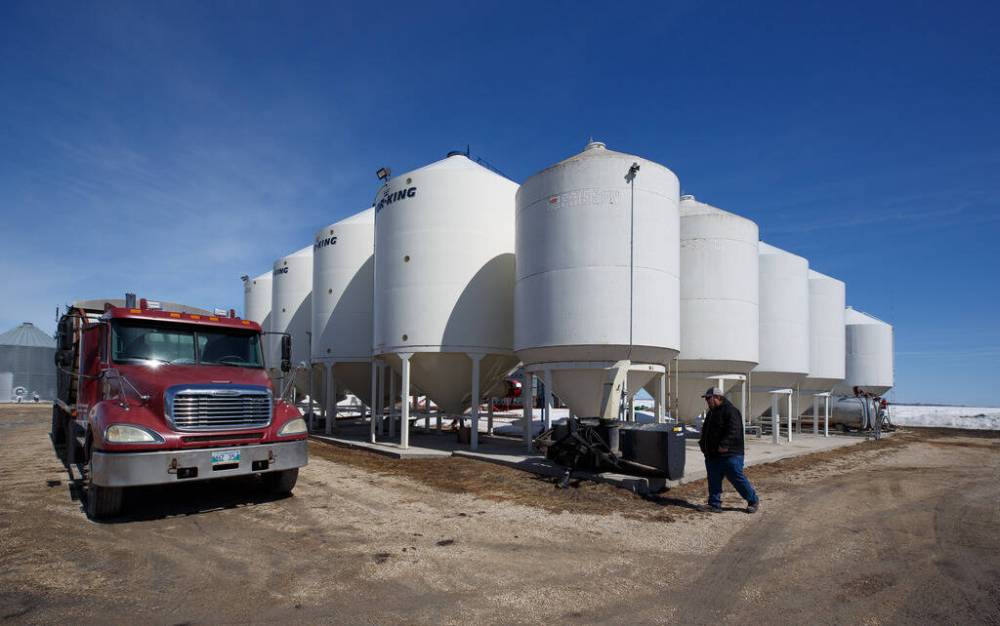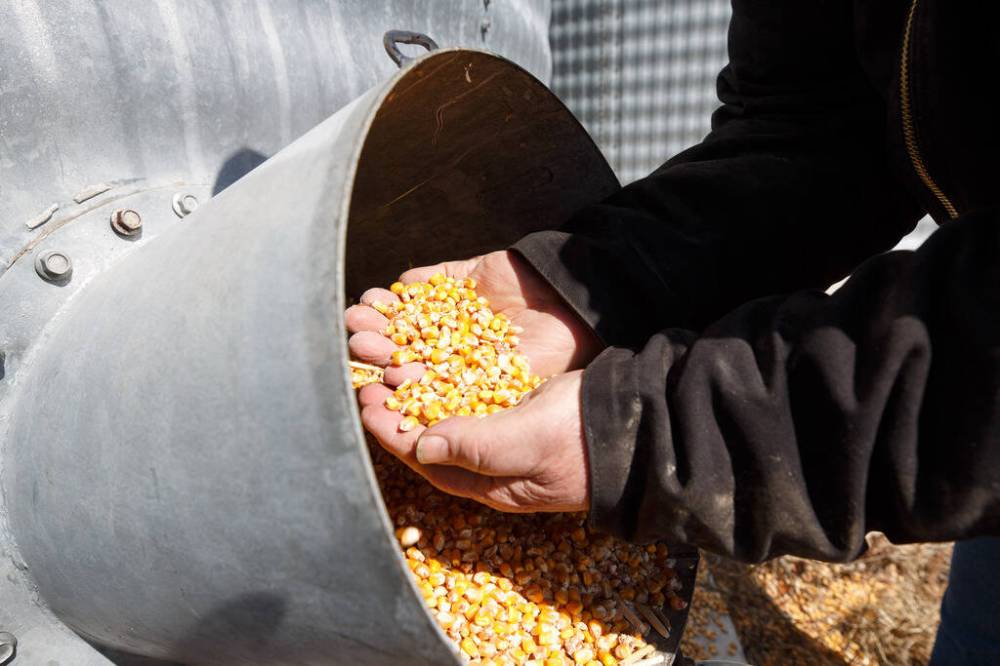Growing concerns Ripples from war in Ukraine washing over Manitoba’s agriculture sector
Read this article for free:
or
Already have an account? Log in here »
To continue reading, please subscribe:
Monthly Digital Subscription
$0 for the first 4 weeks*
- Enjoy unlimited reading on winnipegfreepress.com
- Read the E-Edition, our digital replica newspaper
- Access News Break, our award-winning app
- Play interactive puzzles
*No charge for 4 weeks then price increases to the regular rate of $19.00 plus GST every four weeks. Offer available to new and qualified returning subscribers only. Cancel any time.
Monthly Digital Subscription
$4.75/week*
- Enjoy unlimited reading on winnipegfreepress.com
- Read the E-Edition, our digital replica newspaper
- Access News Break, our award-winning app
- Play interactive puzzles
*Billed as $19 plus GST every four weeks. Cancel any time.
To continue reading, please subscribe:
Add Free Press access to your Brandon Sun subscription for only an additional
$1 for the first 4 weeks*
*Your next subscription payment will increase by $1.00 and you will be charged $16.99 plus GST for four weeks. After four weeks, your payment will increase to $23.99 plus GST every four weeks.
Read unlimited articles for free today:
or
Already have an account? Log in here »
Hey there, time traveller!
This article was published 08/04/2022 (1341 days ago), so information in it may no longer be current.
As the brutal war in Ukraine wreaks havoc on millions of people’s lives it also means a significant disruption in normal economic production.
And since the Black Sea region is one of the great bread baskets of the world, that means agricultural production and exporting is grinding to a halt.
Russia and Ukraine account for about one quarter of the global grain trade and disruption in the supply chain is sending just about every agricultural commodity price up, some to historic highs.
The higher prices are a boon to Manitoba farmers, but many local industry experts say that the month-long war has not changed seeding decisions to take advantage of shortfalls in supply of specific crops.
For instance, Ukraine accounts for close to 50 per cent of the global sunflower oil exports and while there are reports about increasing sunflower seeding in the U.S. and Argentina, that does not seem to be the case in Manitoba.

The province accounts for about 90 per cent of the sunflower grown in Canada, but it only represents about one per cent of the actual agricultural acreage in Manitoba.
Most producers make their seeding decisions for next year during harvest time, six months before seeding. That is also the time when farmers will apply fertilizer for next year’s crops
Chuck Fossay, a grain farmer in Starbuck just west of Winnipeg, said in thinking about crop selection, said military conflict isn’t the only consideration affecting farmers.
“The war in Ukraine is a wild card. But another big wild card is that fertilizer prices have more than doubled compared to a year ago,” he said.
Because the ground was so dry last year, some farmers may have chosen to wait to apply fertilizer, and that may impact their decision on what to plant on those fields this year. For instance some crops like soy beans and sunflowers, do not require nitrogen fertilizer and some may switch to those crops for those fields, Fossay said.
“The war in Ukraine is a wild card. But another big wild card is that fertilizer prices have more than doubled compared to a year ago.” – Grain farmer Chuck Fossay
Even if there are those kinds of decisions being made, it is not expected to alter the traditional ratio of Manitoba crops.
With about 10 million acres of crop land in Manitoba, typically about 30 per cent is planted with wheat, 30 per cent canola and the rest split between soy, barley, oats, flax, peas and sunflower.
Neil Townsend, the senior market analyst at FarmLink Marketing Solutions, a grain marketing company, said, “We don’t see significant acreage shifts in Manitoba this year. The number 1 risk management technique for farmers is crop rotation. They never really stray too far from that and with so much uncertainty and volatility it makes a lot of farmers stick to crop rotation even more.”
But Daryl Domitruk, executive director of Manitoba Pulse and Soybean Growers, said predicting seeding outcomes this year is tricky calling it one of the riskiest predictions to make at this point in history.
“Normally we have a pretty good idea and can make some reasonably accurate predictions, but there are so many moving parts this year,” he said. “Everyone I have talked to shrinks away from making predictions.”
“Normally we have a pretty good idea and can make some reasonably accurate predictions, but there are so many moving parts this year.” – Daryl Domitruk, executive director of Manitoba Pulse and Soybean Growers
He said while some think there would be an increase in soy and peas because they don’t require nitrogen fertilizer, which is very expensive this year, last year’s drought left a deficit of good quality pea seeds.
And even though soy prices are good, prices on everything else are strong as well.
Fossay said, “I would say this is probably the first time in several years where wheat is going to make me a significant profit. Ten years ago when doing my wheat budget, lots of time I might break even, I might make $20 per acre, I might lose $10 per acre. Right now almost any crop you grow if you get an average yield you are definitely going to be locking in a profit.”
So even though sunflower might be an obvious opportunity, the market in Canada has not traditionally been able to bear much volume.
While sunflower oil is among the most popular vegetable oils in Europe, that is not the case in North America. Even the confectionery market for edible sunflowers is shrinking after a processing plant in Lethbridge closed a couple of years ago.

Scoular Canada, which operates a sunflower processing plant in Winkler with about 30 employees, buys sunflower seeds from Manitoba farmers both for human edible snack foods and black oil sunflowers for use in birdfeed.
While the birdfeed market is up since the pandemic — people have more time to feed the birds in the backyard — it hasn’t boosted prices.
“The war in Ukraine is having an effect and people are watching but there has not been a big swing on prices in the last little while,” said Jody Locke, an official at Scoular.
Regardless of Manitoba farmers’ crop selection, the war in Ukraine is having a significant impact on the Manitoba ag community.
“The Ukrainian community is at the foundation of agriculture in our province,” said Brenna Mahoney, the general manager of Keystone Agricultural Producers. “This is really hitting home on an emotional and personal level, let alone on business decisions. People are worrying about what is coming next.”
martin.cash@winnipegfreepress.com

Martin Cash has been writing a column and business news at the Free Press since 1989. Over those years he’s written through a number of business cycles and the rise and fall (and rise) in fortunes of many local businesses.
Our newsroom depends on a growing audience of readers to power our journalism. If you are not a paid reader, please consider becoming a subscriber.
Our newsroom depends on its audience of readers to power our journalism. Thank you for your support.








